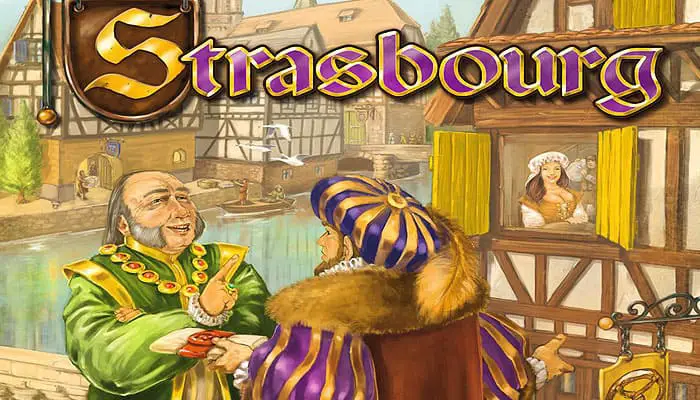
Strasbourg in the 15th century. The city's fortunes are powerfully influenced by the craft guilds who occasionally even occupy the majority of seats on the city council.
You take on the roles of the city's ambitious families. Your goal is to get your own family members admitted to the guilds. Only the clever use of Influence Points will make it possible for them to be accepted as an Apprentice, Journeyman, or even a Master-provided that you have the money for the appropriate entrance fees on hand. But never underestimate the power of the Nobility and the Church!
Components
- 1 Board
- 5 Round Cards
- 1 Summary Sheet
- 5 Screens
- 5 Summary Cards
- 120 Influence Cards
- 25 Task Cards
- 30 Goods Tiles (6 of each of the 5 guild colors)
- 5 Edifices
- 10 Privileges
- 40 Coins
- 75 Family Members (15 of each of the 5 player colors)
- 5 presitige markers
The Council
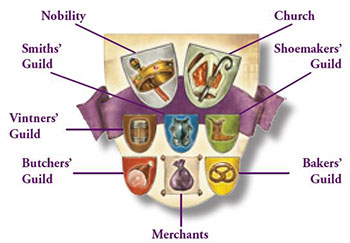
On the top half of the Board you'll find the Council of the city. On the Council, there are 8 Seats which your family members may occupy.
The Nobility and the Church each are entitled to one seat on the council (top row).
5 Seats belong to the 5 Guilds: the Smiths, the Vintners, the Shoemakers, the Butchers, and the Bakers (represented by their respective Guild Coats of Arms). The eighth Seat is for the Merchants (represented by the Money Bag).
Whenever in the course of the game, a player places a Family Member on one of the Council Seats, return the Family Member who had previously occupied the Seat back to the appropriate player.
Setup
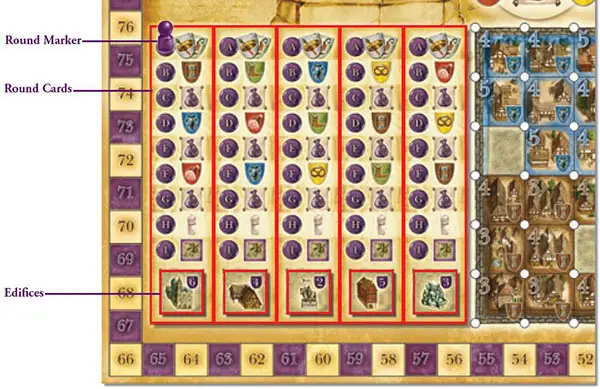
Place the board in the middle of the players. Shuffle the 5 Round Cards, and place them in a random order face up on the five spaces on the left side of board. Place the Round Marker on Space A of the leftmost Round Card. Then shuffle the 5 Edifices and place them also in a random order face up on the 5 spaces provided on the bottom of the Round Cards.
Each player chooses a Player Color and takes the 15 Family Members and 24 Influence Cards of that color. Shuffle your Influence Cards and place them face down as a deck in front of you.
In addition, each player receives 1 Summary Card, 1 Screen, and Coins of a total value of 5, which you place behind your Screen. The leftover Coins, as well as all the Goods, Privileges, and Chapels are placed in a common pool.

Place the Prestige Marker of your color on the starting space of the Prestige Path. Whenever you receive Prestige Points during the course of the game, you move your Prestige Marker a corresponding number of spaces farther.
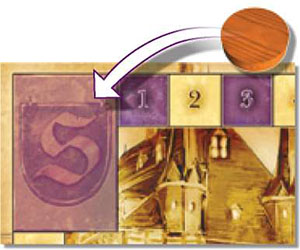
Whoever was most recently in Strasbourg (or a random player) is the Starting Player. He takes the Starting Player Marker and places 1 of his Family Members in the Nobility's Seat of the Council. The player to his left places 1 of his Family Members in the Church's Seat of the Council. (The rest of the Council Seats remain unoccupied at first).
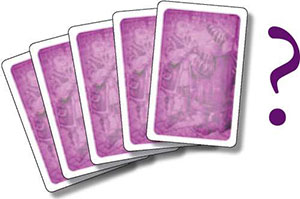
Shuffle all the Task Cards and deal them face down until each player has 5 Task Cards. Look at your 5 cards and decide how many and which of them you want to keep and how many you want to discard. You must keep at least 1 Task Card and may keep up to 5 Task Cards.
Place the cards you keep behind your Screen. You may keep the number of cards you have secret as well. Place cards you want to discard back in the box. Tasks you fulfill bring Prestige Points at the end of the game; unfulfilled tasks lose you Points.
Tip: Family Members, Coins, Goods, and Privileges are in theory unlimited in availability. Should the very rare case arise that the included game materials are insufficient, please add coins, dice, gummi bears, or other suitable tokens.
Gamepiay
A game proceeds over 5 Rounds. Each Round is divided into 3 Phases which follow one after the other:
- Planning Phase
- Action Phase
- Council Phase
I. Planning Phase
For a brisk game, we recommend that all players resolve the Planning Phase simultaneously. If, however, going in order is important to you, begin with the Starting Player and have the other players follow in clockwise order.
The Planning Phase has 2 Steps. In the first Step, you decide the number of Influence Cards you play this Round. Draw the top Influence Card from your deck and look at it.
Now decide card-by- card if you want to draw another card from the deck or if you wish to stop. You may not put drawn cards back in the deck. You may draw as many cards as you like from the deck, but remember that the deck must last for all 5 Rounds!
In the second Step of this Phase you have to divide up the cards you have drawn into several Influence Stacks. You may choose freely how many Stacks you build and how many cards are in each Stack. Stacks may consist of only 1 card. Put all your Influence Stacks face down in front of you, slightly fanned so that every player can see how many cards each Stack contains.
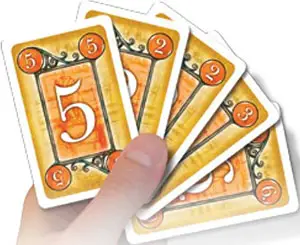
As soon as all players are done, the Planning Phase ends. From now on, you may inspect your Stacks any time, but you may no longer change the compositions of the Stacks.
Example: Nicole first draws a 5, then a 2, and then another 2. She chooses not to stop and draws a 3. She wants more, so she draws a 6. After a brief consideration, Nicole decides to stop. She has 5 Influence Cards in her hand.
Then Nicole divides her cards into 4 Stacks: the 3 and one 2 she puts together in one Stack, and the other 3 cards she puts down alone as their own Stacks in front of her. She could also have built a three-card and a two- card Stack or a five-card Stack, or five one- card Stacks, etc.
II. Action Phase
The Action Phase consists of 9 Steps which are depicted on the Round Cards with the spaces A through I.
The Round Marker indicates which Step is currently active. At the beginning of this Phase is Step A. As soon as you resolve one Step, move the Round Marker one space down, and conduct the next Step.
When you have finished Step I, put the Round Marker on Step A of the next Round and end the Action Phase. Below, the Steps are explained more precisely.
General Remarks On Influence A B C D E F G
The first 7 Steps A-G all proceed identically. They only differ from each other in their effects.
The Starting Player begins. He has the choice to either turn over one of his Influence Stacks or to pass. He may freely choose which of the Stacks he cares to turn over. Then the other players follow in like fashion in clockwise order. After each player has had one turn, determine your order of precedence based on the sums of the Influence Points that you have turned over.
Whoever has turned over the most Influence Points occupies 1st Place, the player with the second-most Influence Points 2nd Place, and so forth. In the case of a tie, the player sitting closer to the Starting Player (in player order) gets precedence. The Starting Player wins all ties in which he is involved. Anyone who has passed, goes out empty-handed and may take no action in the current Step.
The player in 1st Place immediately becomes the new Starting Player and takes the Starting Player Marker. (If all the players pass, the Starting Player remains the same). Depending on the Step, 1, 2, or 3 players may now take one or more Actions.
After these Actions, place the Influence Cards turned over back in the box.
Exception: If someone who turned over an Influence Stack is not eligible to take an Action, he may take exactly 1 Card from that Stack and place it at the bottom of his Deck. The rest of the cards go back in the box.
Any Influence Stack not brought into play by the end of the round is put in the box unused.
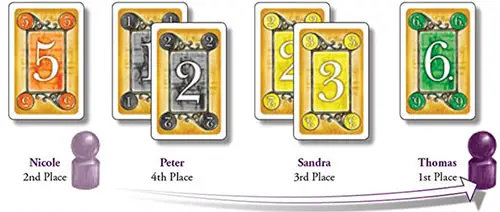
Example: In a four-player game, in Step B, the players can influence the Vintners' Guild. Nicole (orange) is the Starting Player. She turns over a Stack with one card with the value 5. Nicole is therefore employing 5 Influence Points in this Step. To her left sits Peter (black) who turns over a Stack of 2 cards with a combined value of 3. Sandra (yellow) follows; she first considers passing but then decides to turn over a Stack worth 5 Points. Finally, it is Thomas's turn (green), and he turns over a 6.
The order of precedence is determined: with 6 points, Thomas is in 1st Place. With 5 Points each, Nicole and Sandra are even, but Nicole is better situated as the Starting Player and takes 2nd Place. Sandra lands in 3rd Place and Peter in 4th Place. Thomas takes the Starting Player Marker. In Step C, he must first decide how many Influence Points he is employing.
Thereafter, Thomas, Nicole, and Sandra conduct their Actions. (For which, see the following examples). Peter sits the Step out, placing his 2 at the bottom of his Deck and the 1 in the box.
Influence the Nobility & Church A
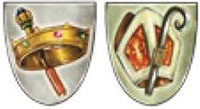
The player in 1st Place places 1 Family Member on the Nobility's Seat of the Council.
The player in 2nd Place places 1 Family Member on the Church's Seat of the Council. The players in 3rd and lower Place sit out.
Influence a Guild B D F
The player in 1st Place may place a Master in the appropriate Guild, the player in 2nd Place a Journeyman, and the player in 3rd Place an Apprentice. All the remaining players sit out.
Exception: In a three-player game the Journeyman is omitted! That is, the player in 2nd Place may place an Apprentice, and the 3rd Place player sits out.
Master
As a Master, you may perform 3 different actions:
- Place 1 Family Member on the Council Seat of the corresponding Guild.
- Take 1 Goods Tile of the corresponding Guild from the pool and place it behind your screen.
- Place 1 Family Member on an empty space of the corresponding Guild in the City. Pay the Price indicated on the space in the form of Coins. If you do not have sufficient Coins, you cannot perform this action. This action is voluntary; you may forgo it.
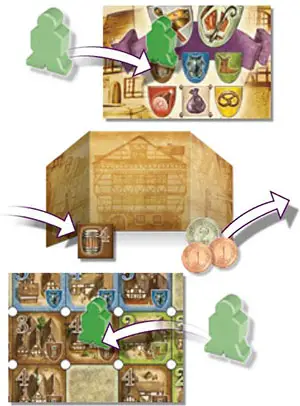
Example: Thomas occupies 1st Place and may install a Master in the Vintners' Guild. He places 1 Member of his family on the Council Seat of the Vintners' Guild. Then he takes 1 Goods Tile with a cask out of the pool. Finally, he places 1 Family Member on a Vintners' Guild space in the City, paying 4 Coins in order to do so.
Journeyman
As a Journeyman, you may perform 2 different actions:
- Take 1 Goods Tile of the corresponding Guild from the pool and place it behind your screen.
- Place 1 Family Member on an empty space of the corresponding Guild in the City. Pay the Price indicated on the space in the form of Coins. If you do not have sufficient Coins, you cannot perform this action. This action is voluntary; you may forgo it.
Example: Nicole is in 2nd Place and may install a Journeyman. She takes one Goods Tile with a cask out of the pool and places 1 Family Member on a different field than Thomas, paying 3 or 4 Coins to do so, depending on which space she chooses.
Apprentice
As an Apprentice, you may perform 1 action, choosing one of these two options:
- Either take 1 Goods Tile of the corresponding Guild from the pool and place it behind your screen.
- Or place 1 Family Member on an empty space of the corresponding Guild in the City. Pay the Price indicated on the space in the form of Coins. If you do not have sufficient Coins, you cannot perform this action.
Example: Sandra is in 3rd Place and may install an Apprentice. She decides not to place 1 Family Member in the City, deciding to take a Goods Tile.
Influence Merchants C E G
The player in 1st Place may sell as many Goods in his possession to the Merchants as he cares to. To do so, he places the Goods back in the pool and receives in return the value printed on them in Coins from the pool. All other players sit out.
Note: In Step G (not in C or E!) the player in 1st Place additionally places 1 Family Member on the Merchants' Council Seat.
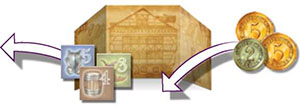
Example: Later in the game, Nicole has accumulated a few Goods behind her Screen: 1 Weapon, 1 Cask, and 1 Shoe. She succeeds in playing the most Influence Points with the Merchants. She places all 3 Goods back in the pool and takes 12 Coins in total for them.
Build Chapel H
The player whose Family Member currently occupies the Church's Seat on the Council takes 1 Chapel from the pool and places it on any open white, round space of his choice in the City.
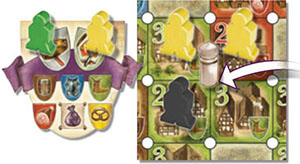
Example: One of Sandra's Family Members occupies the Church's Seat, therefore Sandra may build a Chapel in this Round. She places the Chapel so that it is directly next to two of her Family Members.
Build Edifice I
The player whose Family Member currently occupies the Nobility's Seat on the Council takes this round's Edifice and places it on an open building space of his choice. The building spaces are the 7 empty spaces in the City.
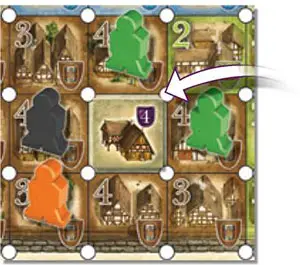
Example: One of Thomas's Family Members occupies the Nobility's Seat (see at left), so Thomas may build an Edifice this Round-an Inn. He places the Inn so that two of his Family Members are standing directly next to it.
III. Council Phase
Each player receives Prestige Points equal to the number of his Family Members on the Council. In addition, the player who has the most Family Members on the Council receives 1 Privilege and places it behind his Screen. In the case of a tie, all the tied players receive 1 Privilege each.
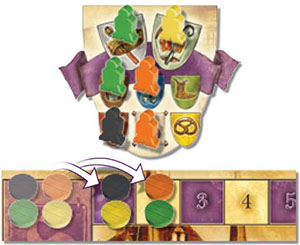
Example: In a later Round, Thomas is the Starting Player when the Smiths' Guild may be influenced. Thomas gives up 1 Privilege and waits. Next is Nicole's turn, and she also gives up 1 Privilege so that she may go after Thomas.
Peter goes first, turning over an Influence Stack, and Sandra Passes. It is Thomas's turn again, and he gives up another Privilege. Nicole has to go next, as she is out of Privileges and must now decide how many Influence Points to play before Thomas.
Privilege
Privileges may be employed in later Rounds. During one of the Steps from A to G in the Action Phase, you may give up 1 Privilege instead of deciding whether to turn over an Influence Stack or to pass. You sit out your turn without passing, and after all the other layers have decided, you receive an additional turn. In a given Phase, as many Privileges may be played as you like.
Example: At the end of the first Round, Thomas and Nicole each receive 2 Prestige Points, Peter and Sandra 1 each. Two Seats are still unoccupied because these guilds only take Masters in later Rounds. Additionally Thomas and Nicole each receive 1 Privilege.
End of the Game
The game ends after the 5th Round. Now you receive Prestige Points for a variety of things:
- Each of your Family Members in the City gives you 1 Prestige Point.
- Each Chapel brings you 1 Prestige point for each of your Family Members in the directly adjacent spaces.
- Each Edifice gives you Prestige Points equal to the number given on it for each of your Family Members who are on a space directly bordering the Edifice vertically or horizontally.
- For every unplayed Privilege, you receive 1 Prestige Point.
- For each fulfilled Task Card at the end of the game, you receive as many Prestige Points as are given on it. These points may be received at most once per card, even if you have fulfilled the Task more than once.
- For each unfulfilled Task Card at the end of the game, you lose 3 Prestige Points.
You cannot fulfill Task Cards during the game, but only at the end of the game. You will find an exact description of all the Task Cards on the included Summary Sheet.
The player with the most Prestige Points wins the game. In the case of a tie, the player with more Family Members in the City wins. If this is also tied, there is more than one winner.
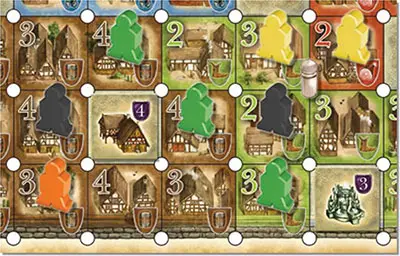
Example: Peter (black) receives 2 Prestige Points for his 2 Family Members. The Chapel gives him 1 more Point. He receives 4 Points for the Inn.
Sandra (yellow) also receives 2 Points for her Family Members. The Chapel yields her 2 further Points because both her Family Members are right next to it.
Thomas (green) gets 3 Points for his 3 Family Members. The Inn brings him 8 Points because he has Family Members on 2 of the directly adjacent spaces. The Fountain brings him 3 further Points.
Nicole (orange) receives 1 Point for her Family Member. The Inn brings her no points, because her Family Member borders it diagonally.
Continue Reading
